#order of toledo
Explore tagged Tumblr posts
Text
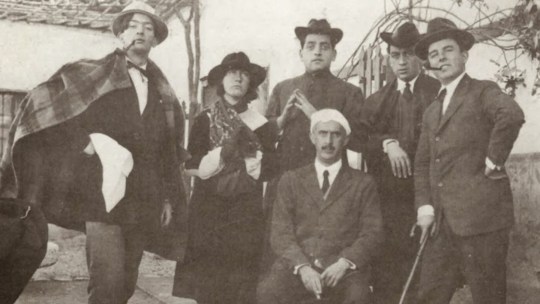
A century of the Order of thuggish and drunken knights: Lorca, Dalí and Buñuel partying in Toledo
Federico García Lorca was wrapped in a sheet stolen from the Posada de la Sangre – which disappeared in the Civil War and was the scene of Miguel de Cervantes's The Illustrious Mop –, drunk as a thief and with the desire to wander alone through the narrow streets of the old town of Toledo. Around him, some young hooligans laughed with the poet with noise and hubbub. This is how a Toledo man named Eduardo met the playwright from Granada during a Toledo night in the 1920s. At that moment, this kind man, seeing the panorama, tried to take Lorca to the relief house on Barco Street, but He flatly refused to accompany him. The poor man, of course, did not understand anything.
What this Toledoan, grandfather of the author of the space Toledo Olvidado, who is the one who told this anecdote, did not know is that Lorca was complying with one of the strict rules of the well-known Order of Toledo, a brotherhood of artists and writers related to the Generation of '27 and the Madrid Student Residence created by Luis Buñuel – calling himself Condestable – in the Venta de Aires de Toledo restaurant in March 1923.
This is how a century ago the streets of Toledo could not believe what was happening on its cobblestones. One hundred years since Buñuel, with his idea, managed to revolutionize the students of the Residence and the silent alleys of the old town of Toledo. Despite such famous components, the truth is that little or very little is known about this Order of Toledo. There is not much documentation available, beyond the stories of the protagonists themselves. Buñuel, the architect of this mischievous and intellectual action, dedicates an entire chapter to the Order in My Last Sigh, his autobiography written in his exile in Mexico.
A religious revelation and the smell of wine
«I am walking through the cloister of the cathedral, completely drunk, when, suddenly, I hear thousands of birds singing and something tells me that I must immediately enter the Carmelites, not to become a friar, but to steal the convent's treasury. The doorman opens the door for me and a friar comes. I tell him about my sudden and fervent desire to become a Carmelite. He, who has undoubtedly noticed the smell of wine, walks me to the door. The next day I made the decision to found the Order of Toledo," explains Buñuel in the aforementioned autobiography.
The rules of the Order of Toledo are strict and taken very seriously by its members. So much so that some of them even had a little problem or another in 1936, as the poet José Moreno Villa told us from Mexico, after the outbreak of the Spanish Civil War. "This order is a bit communist," thought some "men alien to letters and much more alien to irony"; although the truth is that there was only a hint of provocation in this crazy association. A normal thing among extravagant artists, somewhat dadaist, somewhat surrealist. «The starting point was to have fun, have a good time and get drunk. But it is true that, personally, I have always related what these young people did in Toledo with the historical avant-garde of the moment. I see it as the performances that the Dadaists did in Paris and Zurich, which were things that didn't make much sense, as Surrealism later adopted. In fact, it is worth noting that some members of this Order of Toledo were part of the Paris surrealist group, like Buñuel or Dalí himself,” explains Juan Carlos Pantoja, author of The Order of Toledo: imaginary avant-garde walks*.
Pantoja also details that, possibly, there were some precedents to Buñuel's Order of Toledo because "there was already a group of great intellectuals, among whom were Américo Castro, Alfonso Reyes, Antonio García Solalinde or Moreno Villa, who met in Toledo to walk at night and drink wine from 1917 onwards. He details that "they stayed in a rented house on Cárcel del Vicario street, in front of the Cathedral, and they became known as the gathering of El Ventanillo, due to the existence of a small window with views of the Valley. Buñuel says that he got to know Toledo accompanying Solalinde, so we can think that perhaps the Aragonese was at some point in these gatherings and that, from there, the idea of doing something similar arose. Pepín Bello – who left no work, but was a friend to everyone, as gallery owner Guillermo de Osma once commented –, Rafael Alberti, Dalí, María Teresa León and Federico García Lorca and his brother, among others, were part of the Brotherhood created by way improvised by Buñuel that had something of a "poetic act", according to the poet from Cádiz. And the students of the Residence were lovers of Toledo, according to Bello in an interview in 2000:« We took the train from Madrid to Toledo, we traveled in third class and it took us two hours to arrive. We went up from the station and went to drink in the taverns of Zocodover, which was very close to the Posada de la Sangre, to get into the mood a little »
Order of Toledo: drink wine and do not shower
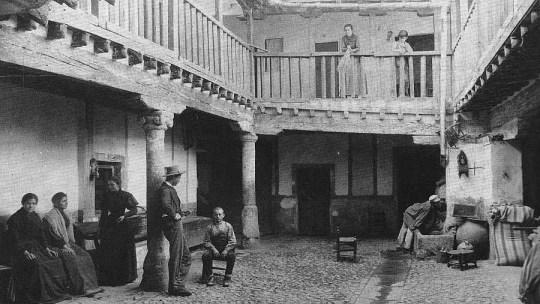
Courtyard of the Blood Inn
Among the rules of the Order of Toledo, and which Buñuel said with his Calanda crudeness, was that of not washing or showering "while the visit in this Holy City lasted." They had to go to Toledo once a year, watch over Cardinal Tavera's tomb, love Toledo above all and, of course, "wander, especially at night, through the wonderful and magical city of the Tagus," according to Alberti. "Those who preferred to go to bed early could not qualify for the rank of knight, little more than the title of squire," explains Buñuel in his autobiography. Furthermore, Pantoja details, "each of the members had to contribute ten pesetas to the common fund for accommodation and food and to go to Toledo as frequently as possible and put themselves in a position to live the most unforgettable experiences." Bello points out, recalling Toledo's adventures in an interview, that "we stayed at the Posada de la Sangre because we were students and it was difficult for us to sleep for just one peseta. Of course, it was a place of dubious cleanliness, where mainly muleteers stopped with their animals. The poet María Teresa León, in her book Memory of Melancholy, also remembered that this inn “had little rooms with just one bed. There, Rafael [Alberti], that night we didn't talk about El Greco, but we did talk about bedbugs. Toledo bedbugs! Toledoan night! I turned on the light. How well Rafael slept with his chest crossed by hundreds of little animals frantically searching for the hiding place of poetry!
Alberti precisely explains in The Lost Grove that "the brothers left the inn when the cathedral clock struck one, a time when all of Toledo seems to narrow, become even more complicated in its ghostly and silent labyrinth" and also relates in detail how He experienced firsthand his initiation into the Order of Toledo, with some fear at not knowing anything about the labyrinthine streets of Toledo.
«We went out into the street, carrying all the brothers, except me, hidden under the jacket, the sleeping sheets, taken out quietly. The poetic act was going to consist of bringing to life an entire theory of ghosts in the atrium and plaza of Santo Domingo el Real. After weaving and unweaving steps between the deep crevices of sleeping Toledo, we ended up at the convent at a moment when its defended windows lit up, filling them with veiled songs and monkish prayers. While the monotonous prayers went on, the brothers, who had left me alone at one end of the square, covered themselves with the sheets, seeming slow and distanced, white and real ghosts from another time. The suggestion and fear that I began to feel were increasing, when suddenly, the dressed visions appeared, shouting at me: 'This way, this way!', sinking into the narrow alleys, leaving me - one of the worst tests I have ever faced. the novices were subjected – abandoned, alone, lost in that frightening winding of Toledo, without knowing where I was and without the possibility of someone showing me the way to the inn, in addition to not finding a single passerby at that point in the night, in Toledo, if they don't inform someone every 30 meters, you can consider yourself lost definitively. At dawn I found the Posada de la Sangre, and I went to sleep, happy with my first adventure as an initiate into the mysteries of the Toledo order,” Alberti recalled years later. Food and comedy at Venta de Aires
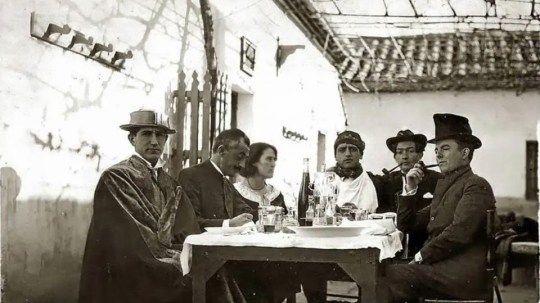
Members of the Order of Toledo, at the Venta de Aires
In Toledo, the members of this order ate, explains Buñuel, "almost always in taverns, such as Venta de Aires, on the outskirts, where we always ordered tortilla on horseback - with pork -, a partridge and white wine from Yepes." . There, in this sale, the friends performed for the first time Don Juan Tenorio, by José Zorrilla, dressed in improvised costumes, where we see that Buñuel is dressed as a parish priest, an irreverence with respect to the church and the double standards of its members that We will always see them reflected in their films. «With regard to this, this relationship between artists and religion, Max Aub told the anecdote that while walking through Toledo they found a Virgin in a niche on the street, it could be the one still located on Alfileritos Street, although it is not documented, that Dalí began to pray in a devout and tender manner, but suddenly began spitting at her angrily and insulting her. He went from one thing to another in an incomprehensible way, once again showing off his surrealist thinking," explains Pantoja.
Alberti says that also on the walls of the Venta de Aires, the brothers of the Order had left the mark of their art. «Under the arbor, the patio of our banquet, the main brothers were portrayed in pencil on the whitewash of the wall. Its author, Salvador Dalí, was also among them. Someone told the innkeepers not to whitewash them, that they were worthy works by a famous painter and that they were worth a lot of money. Despite the warning, years later they no longer existed. They had been erased by new owners of the sale," explains the poet. After eating, they returned to Zocodover, always on foot, making "an obligatory stop at the tomb of Cardinal Tavera, sculpted by Berruguete. A few minutes of contemplation in front of the recumbent statue of the cardinal, dead of alabaster, with pale and sunken cheeks, captured by the sculptor one or two hours before the putrefaction began," adds the filmmaker.
Fisticuffs with the cadets of the Military Academy
Upon returning to the old town, the Order even experienced some fights with the cadets of the Toledo Military Infantry Academy, after some of them rudely complimented María Teresa León, an anecdote that she herself tells. «At I don't know what time, just when we were visiting some taverns to balance with so much church, we came face to face with a group of uniformed boys, who turned to me and said: 'Blonde, I would eat you with suit and with everything'. Buñuel rolled up the sleeves of his shirt and when he saw him advance, the boys ran out so as not to commit themselves to Aragon, a region where the insults are harsher. They caught up with them and, after several punches, the cadets were defeated. A neighbor handed us a jug: 'Drink, drink. These cadets always making a fuss!' Meanwhile, she licked her lips with pleasure because the civilians had beaten the military, those boys are always on the hunt for Toledoan girls," León said.
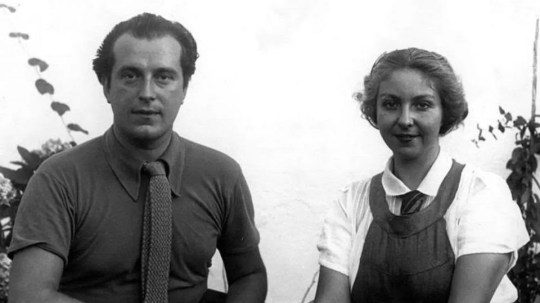
Rafael Alberti and María Teresa León, poets of the Generation of '27 and members of the Order of Toledo
A confrontation with the military that Buñuel also remembers, although in a somewhat less refined way than the poet. The film director explains in his memoirs. «The cadets were really scary. One day we came across two of them and grabbing María Teresa, Alberti's wife, by the arm, they told her: 'How horny you are.' She protests, offended, I go to her defense and knock down the cadets with my fists. Pierre Unik comes to my aid and kicks one of them. There were seven of us and the two of them, we did not boast. We leave and two civil guards who had seen the fight from afar approach, instead of reprimanding us, they advise us to leave Toledo as soon as possible, to avoid the revenge of the cadets. We don't pay attention to them, and for once, nothing happens».
The Order of Toledo in Tristana
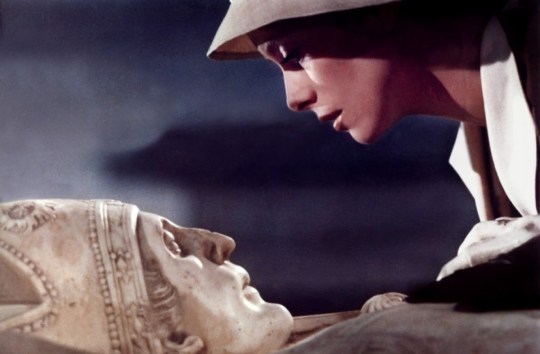
This entire Order of Toledo is reflected in Tristana, the film that Buñuel would shoot here in Toledo. Pantoja defends that "he winked at his youthful adventures, with Catherine Deneuve wandering the streets and visiting Cardinal Tavera, and bringing his face closer to him, which is one of the great images of the film." «That Order of Toledo laughed at everything, nothing was taken too seriously. They laughed at art, like the futurists did, who advocated burning museums and libraries, and they did everything, in addition, in a groundbreaking way. Their lives, without a doubt, were pure avant-garde," concludes Pantoja.
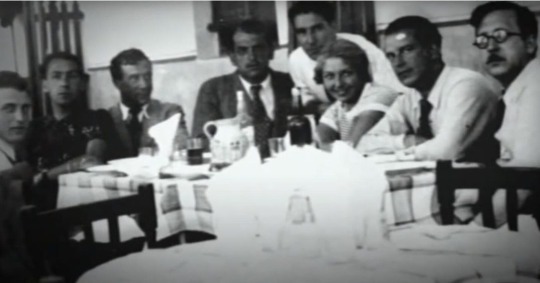
* I have scans of this book, I am planning to publish them here on Tumblr on a series of posts
#la orden de toledo#caballeros de la orden de toledo#knights of the order of toledo#federico garcía lorca#luis buñuel#salvador dalí#order of toledo#maría teresa león#rafael alberti#pepín bello#josé moreno villa
2 notes
·
View notes
Note
have you added more will toledos to your pinned. i swear last time i counted there were 15 now therws 30. i cant count very well im stoned but whay the fuck. mitosis
no he did that by himself
4 notes
·
View notes
Text

#mine#photography#abandoned#ohio#silhouette#art#looks like the kind of picture that would get big on here in like 2014#also im posting all my really old work and this one is out of order but oh well#subscribe and remember to leave five stars#toledo#summer#memories#college
0 notes
Text
Love Languages. | Bungou Stray Dogs
inc: dazai, chuuya, akutagawa, tecchou, jouno
written in 2nd pov (female reader implied)
song recc: do you love by trish toledo & baby bash
word count: 2324 words
pretty sure everything is written in lowercase except for names if they didn't look ugly capitalized bc aesthetics !!! had tons of fun writing this I apologize, this is barely proofread and for literally every character I got too caught up in specific examples and scenarios and just kept building off of it but I think they're kind of sweet so I hope u enjoy <3
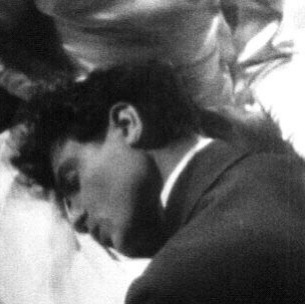


dazai osamu - acts of service
“she peels an orange for us in the morning / she woke me up to give me half” golden girl - frank ocean
he’s terrible at taking care of himself, so someone who takes the time to care for him just makes every wall crumble
he’s probably horrible at remembering to eat as well, so if you make something for him he’ll treasure it forever
bonus points if your job requires you to wake up earlier than him (which isn’t hard, he def comes in a little later than his coworkers) and you leave something for him to eat when he wakes up or to take with him to work (or both <3)
he’ll start to look forward to waking up in the mornings in hope that you’ve made him something
never asks you if you’ll make something in specific or if you’ll even make him something at all. he adores anything you make and doesn’t want to make you feel obliged to do something if you happen to be tired and don’t want to cook tomorrow
voices all his appreciation for you when you both have laid down to go to sleep
“bella, I can’t tell you how much it means to me, all that you do. you really don’t have to make me anything if it’s a hassle in the morning or when you get home. you already work so hard.”
you turned onto your other side to face him, pushing a stray lock of hair behind his ear as you smiled, “I do it because I want to, ‘Samu. and because I love you. if I can’t spend the day with you because we’re both at work, at least I can take care of you.”
his chest buzzed with so much happiness his eyes stung for a moment. he held himself back from saying that he didn’t deserve you. saying something like that wouldn’t solve anything. instead, he’d make himself worthy of you by helping out as well
he probably can’t cook very well but he finds other ways to help, washing the dishes, doing the laundry, getting groceries, and cleaning the place so that there’s less on your plate
ask him to do anything and he’ll get it done for you as soon as possible <3
I think that for him, receiving such sweet love without any words is foreign to him but is just what he needs. he’d rather show how much he loves you than say it (although he loves to tell you it as well). getting out of bed could be so difficult for him some days, yet having a goal for himself has motivated him to become a better person. he wakes up, excited for what you may have made him and ready to do whatever he can for you
nakahara chuuya - gift giving
“they asked, ‘do you love her to death?’ I said, ‘speak of her over my grave and watch how she brings me back to life.’” - mahmoud darwish
it’s easier for him to express how much you mean to him by giving you everything you want and everything he thinks you would like
he still tells you that he loves you every chance he gets, but oftentimes it is accompanied by a gift, no matter how small it may be, from just a single rose to a whole garden
for him, it gives a new purpose in his work; he’s working in order to get you whatever your pretty heart desires
he’s proud to use his hard-earned money to buy you things (rather than spending it all on wine <3 ily chuuya)
the easiest thing he can always get you is a favorite snack or drink and he’s got a whole system for it
he knows every store it’s available at and many of the clerks are familiar with him from the sheer amount of times he’s visited them to buy something for you. it never grows old for him, his favorite thing to do is buy you something on his way home from work or during the day when he’s planning to surprise you with a visit
he keeps a mental list of what your favorite things are. you’ll tell him about something you like without thinking anything of it but he’s already planned out when and how to give the item to you. it’s always on his mind what he’ll buy you each day, and it’s always worth it seeing you enjoy whatever he’s bought you
sometimes it’s as simple as a coffee and he’ll drop by your work to give it to you in person
“hanging in there, Angel? need a little pick-me-up?” he has the biggest smile on his face every time he sees you, and bringing a gift for you with him only adds to his excitement
“you spoil me, Chuuya,” you wrap your arms around his neck, leaning further into him as he holds you in his arms.
“what kind of boyfriend would I be if I didn’t?” he responds, rubbing your back as you sigh.
receiving gifts from you is just as sweet. no one has ever given him as many gifts as he’s given others–which is fine with him–it’s not about what he’ll get in return and he knows that not everyone expresses their love the way he does
but he’s touched whenever you get him something. since giving gifts is so meaningful to him, it means even more that someone would go through the trouble to give something back to him
he’ll keep whatever you get him close to him at all times and smile every time he sees it or remembers it
once, you bought him a new chain for his hat and he hasn’t changed it since. it only made the hat more special to him now that it reflects two people that had changed his life
akutagawa ryunosuke - words of affirmation
“my love, you are worth it all.”
we all know how the boy responded to dazai’s praise or even simply just the words “dazai wants to talk to you”
to hear a person who has persisted through his stubborn, aggressive defense say they still love him causes him to start to soften for you
he’s been surrounded by harsh words and people who have exploited him and brushed him to the side whenever he wasn’t needed all his life, so it stirs his heart to hear someone notice things about him and who tells him that they want to stay with him
it’s something reserved for solitary moments just between the two of you for sure, but that makes the time all the more special because he can let down his guard and just be with you
his past has made it hard for him to believe he is worthy of anything other than the murderous skills he’s harnessed in order to get him to where he is in the Mafia, but you’ve shown him that there’s more to him than just how well he can use Rashomon
he never bothers to try and listen to what other people are saying but he always gives his full attention to anything you have to say
he doesn’t even like to hear compliments from anyone else, he doesn’t trust them at all but he trusts and believes anything you tell him, knowing you have the purest intentions of loving and supporting him
after a job, all he wants to do is go home. by the end of the day, he’s sick of everyone around him so on the rare occasion that you decide to visit him, he won’t even notice until you call out to him
he had just finished a job, it was successful, but it had gotten messy. Mori had already told him off and he didn’t want to hear anything from anyone else. he stormed past every piece of vermin that had decided to get in his way, their whispers just barely reaching his ears
“Ryu!” you called out from amongst them, waiting by a door.
“What?” he hadn’t meant to snap, especially when he realized it was you talking to him and his face immediately relaxed when he saw you.
“oh, [y/n].” he immediately started to make his way towards you, the pounding in his head slowly starting to disappear the closer
“I came to pick you up, I’m glad I had good timing,” you smiled, offering your hand.
he took it gently, giving it a soft squeeze, “I’m sorry I responded so rudely, I didn’t–”
“you’re okay, Ryu,” you placed your other hand on top of it, looking him straight in the eyes, keeping a loving smile on your face, “you don’t ever have to be sorry. you’re doing just fine. even better, actually. I’m so proud of all your work and I’m sure you’re tired after everything today. it looked busy.”
the words erased every memory of Mori’s scolding that his head had latched on to in order to beat himself down later on. he felt his cheeks warm a little as he looked away, “you’re too kind to me, [y/n].”
tries his best to also put into words his appreciation but it’s so hard for him to verbally say it; sometimes it comes out wrong
instead, he’s opted for notes most of the time, leaving them on your bedside or in your bag, telling you how thankful he is for you and that he loves you
suehiro tecchou - quality time
“on the train we swapped seats, you wanted the window and I wanted to look at you.” - mahmoud darwish
my boy is always so busy
as soon as he’s off work he just wants to be wherever you’re at
he’d doesn’t mind silence and doesn’t care where he is as long as he’s with you
sometimes gets off work and if you’re not home yet just sneaks into your workplace to be around you
adores following you around and doesn’t always know exactly what you’re doing but he’s just happy to tag along
grocery store dates are some of his favorite moments with you
he loves everything about convenience stores
he loves food and the endless aisles of colorful packages and choices
(it gives him ideas for new food combinations <3)
once bought a himalayan salt shaker simply because
“look [y/n]! they make pink salt :0”
later put said pink salt on top of strawberry ice cream bc they were both pink
he also loves getting to look around the store all the while following you. he admires your organized grocery lists and how you’ve already planned out what you’re going to buy
once you tried to send him out to grab something in an area you’d already passed so that you could continue going down the list
“can you go grab some carrots for me, love? sorry, I forgot to pick them up when we were in the produce section.”
“of course 🙂” his heart is shattering inside of him at the thought of being separated from you.
“do you want to stay with me and we’ll go back later?” you ask, looking up at him with a knowing smile.
“yes pls”
groceries stores are not the only place you guys go tho i promise
if you’re still in school, he’ll accompany you on study dates
never bothers you under any circumstances and if he is and you tell him he’ll stop right away
he could spend all day looking at your pretty face even if you never once looked at him <3
jouno saigiku - physical touch
“you kiss the back of my legs and I want to cry / the sun has come this close, only the sun” “GPS” - Shauan Barbosa
although he can’t see you, he knows your body by heart <3
he’s spent so much time tracing it over and over with his hands
i think his favorite thing to do, especially after a long day at work is flop onto you and just listen to your heartbeat. probably also intertwines one of his hands with yours, often runs other across your skin
loves when you touch him just as much
if he’s lying on top of you and you decide to run a hand through his hair, all of his problems have just melted away
you both have definitely fallen asleep like that countless times no matter what time of day it is
he’s always finding ways to be in close contact with you, making sure that you’re safe and near him
again, he loves loves loves to hold your hand, he’ll reach for it any chance he gets
will also settle for an arm around your shoulder though as long as you’re close to him
definitely the type to also rest his head on top of yours or on your shoulder every chance he gets
if he needs to fidget he won’t even play with his own fingers he’ll just play with yours
i think that with the loss of one sense, the other senses hold so much meaning for him
it’s easier and more meaningful for him to show his love and how much he trusts you through touch rather than just saying it out loud
comes up from behind you to hug you a lot, especially in the kitchen or when you’ve just come home he’s there immediately, hugging you to recharge
“how was your day, my love?”
you always relax in his arms, turning your head slightly to kiss his face which he’s let rest on your shoulder, “it was missing you.”
he placed a chaste kiss on your lips, “i’ll make it all up to you now, darling.”
there was one time that he let you do his hair
he’s never told you how much he enjoyed it; he didn’t even know what you had done to it, but being near your warmth is all he needs and can ask for <3
#dazai x reader#dazai osamu x reader#dazai osamu#chuuya x reader#nakahara chuuya x reader#nakahara chuuya#akutagawa x reader#akutagawa ryunosuke x reader#tecchou x reader#tecchou suehiro x reader#jouno x reader#jouno saigiki x reader#bsd x reader#bsd headcanons
854 notes
·
View notes
Text
Best Care Anywhere and M*A*S*H The 4077th Home Page [x] From the mid 90s through the early 2000s, MASH fandom was largely organized around message boards located on the websites Best Care Anywhere (still active as of Feb 28, 2023) and M*A*S*H The 4077th Home Page. The M*A*S*H The 4077th Home Page, commonly known as "Andy's", referred to its forum as the Bulletin Board and also featured The Officer's Club, a chat room that required users to manually refresh the page in order to see the latest updates. In 2001, a small group of fans from the Bulletin Board and Officer's Club arranged a meet-up in Toledo, Ohio. The Bulletin Board later relocated to its own domain. Fan Fiction Fan fiction was not typically posted to message boards; rather, it was e-mailed to the site owner who would format and post the stories to his site's fan fiction section. Gen and het were the norm, with Hawkeye/Margaret being the most common pairing and Charles/Margaret also developing a loyal following. Rivalry between supporters of the two pairings was largely good-natured. There was a small degree of controversy when the owner of Best Care Anywhere reportedly refused to post a m/m slash story by author Megan Faye. It was also around this time that smaller M*A*S*H fan fiction archives such as Colleen's began to appear. Some of the newer archives allowed slash as well as NC-17 stories.
lots to absorb here but the fact that the ship wars (such as they were) used to be between hawkmarg and charmarg is taking me out. I was born in the right generation
49 notes
·
View notes
Text
Medical Drill

Summary: Just more Team Germany stuff in the Toledo House
CW: smoking, FEM! Reader (referred to as “pretty lady”), general Berlin-ness, secret relationships, implied previous smut
AN: I ADORE Moscow so he’s featured in this. If it is disjointed it's bc I wrote half a month ago and another half while making bread. No beta. @soraya-daydreams <3.
WC: 1.65

You rub your eyes, trying to adjust to the darkness of your room and what must have happened to wake you up so fast. The curtain you drew last night is firmly in place, all your belongings are where they should be. You start to lay your head back down. You bolt upright when you hear another knock on your door followed by the Professor stage whispering.
“Vienna! We need you! Something happened to Moscow! He can’t breathe!”
There is a high chance it’s a drill. You tell yourself. If something is wrong, he will be in your room shaking you awake.
With a sigh, you heave yourself out of your bed and start rummaging through the “medical kits” scattered around your room. The real ones for the heist are still being assembled, so you have old books ranging from Care and Keeping of Farm Animals, to Don Quixote, labelled by which kit they are and the supposed contents. The order of them generally goes from the head down, no.1 being head injuries, no.2 and no.3 being neck and heart respectively. You pluck no.4 - lungs - off the floor and sprint out of your room. The hall is quiet, meaning Moscow must be at the checkpoint with the Professor.
You wince slightly as the steps creek while you run down them. But if you can’t get any sleep, you don’t feel back about the others waking up. Stumbling out the house door you don't even register the temperature change and just keep running.
Moscow and the Professor are sitting at the outside table quietly talking, while every few seconds the Professor looks at his stopwatch. The night is warm with a clear sky so they don’t seem to mind being awake. You run faster outside, trying to make up for lost time. Slaming the “medical kit” on the table you look up at the Professor (ignoring his wincing at how you treat the medical kit) to get your reaction time.
“This says number 5 on it.” Moscow tells you. You almost break your neck with how fast you turn your head to look at the book. You see the clear Medical Kit 4 label and look back at Moscow to see if he actually is having a medical emergency. He lets out a small laugh and pats your arm as if to apologize for pranking you. You feel yourself smile despite the early hours of the morning.
“I’m just messing with you. You did well.” He says. You don’t have it in you to be mad at him, and lightly push his shoulder to let him know you see the funny side.
“Well, good yes. It’s faster than last week's drill. However, in a heist, every moment is crucial to treat the hostages.” The professor tells you moving his fist to articulate his point. Pulling out a seat you sit next to Moscow, who offers you a cigarette. You nod and he hands you one and his lighter. You force yourself to nod and pay attention to the impromptu lecture knowing you’ll never have to work again in a few months.
The professor only has a few more comments, things you make mental notes about to try next time before he bids you a good (but quite early) morning and leaves to prepare for the class day.
“Thanks for doing this,” you say quietly.
“I used to wake up at 4 in the morning for the mines. This is nothing for me.” Moscow tells you.
“Mind if I sit with you for a moment? I’m wide awake now, I don’t think I could sleep.”
Moscow nods and you lapse into a comfortable silence. Moscow is kind to you and praises you in front of Denver for getting an education to gently tease his son. He has ended up being your partner for many heist-related team exercises. At first, it was because his son kept ditching him to team up with Nairobi or Tokyo, but now you prefer to work with him over anyone else. Berlin is a close second.
“How are things going with your boyfriend?” He asks lighting up another cigarette. You frown thinking over his words while you watch the cherry of the cigarette burn. You don’t tell anyone about previous partners you’ve had before joining the heist, trying to keep going through with the future and ignoring your past.
“My who?”
Moscow turns his head to see if you’re joking with him. When he seems you’re not he continues “C'mon, you know. The other half of Team Germany.” He adds extra empathy to the team bit.
You drop your gaze down to your cigarette in the ashtray. Moscow places his hand on your shoulder and gives it a small squeeze. You like Moscow, he’s like one of those uncles who aren’t blood-related but always there for you. He dances with you after three beers and tells you corny jokes.
“I, um, we have been ‘seeing each other’ for a few months.” You say, using air quotes to describe the nature of your relation to the leader of the heist. Moscow shows no anger or judgement, just his kind eyes so you keep going.
“It’s supposed to be causal. And I’m keeping it that way ‘cause who knows what will happen inside the mint. I can see why he was married five times. Part of me wants to go along with it, even after the heist. But I can't risk ruining the money.”
“Are you going to tell him?”
You sigh, watching the wind blow through the bushes. You tell yourself you will but there are so many what-ifs it's hard.
“I’ll decide when we're all on the boat.”
Moscow looks like he has something to add, but isn't sure if he should say it. When he opens his mouth to speak, all that comes out is a bad cough. You rub your hand over his back as he hunches over, carefully watching and waiting before you offer him water or a cough suppressant. Much to your dismay, he resisted, trying to get back to the conversation between you.
"What were you saying?" he asks.
"I can't remember." you lie, and Moscow is kind enough to understand the topic of the conversation entirely.
“Let me cheer you up. Have you heard the one about the doctor and the teacup?"
You turn to look at him, excited for whatever it could be.

“Darling, you look exhausted,” Naririobi says joining you at the table for a lunch break. You nod slowly as if each movement is exhausting you, which isn't far from the truth.
“There was a medical drill last night. I couldn’t sleep after.” You tell her. She nods sympathetically as you reach for another glass of water.
“Go and nap. I’ll wake you before class starts,” she says. Thanking her you push your chair into the table and start to make your way to the stairs.
You’re so close to your bed that you can almost feel the soft pillow under your head when a hand reaches for your wrist. Too tired to question or pull your hand back you just follow the hand to an arm clad in an expensive suit jacket, to a handsome face.
You blink slowly, not to be seductive but to try and get some moisture back into your tired eyes. It helps but also puts you closer to an eye twitch.
“Hey pretty lady, where are you going?” he asks quietly. Everyone else is downstairs eating or outside to enjoy the summer but you appreciate his commitment to keeping it hidden.
“To bed.”
You watch his lips curve into a sharp smile, thinking you’re going to take him with you.
“In the middle of the day? When is everyone awake? That’s risky for you.” He gently twists your wrist so he can kiss the back of your hand. “I like it.”
“I’m going to my bed, alone, to nap,” you correct him, making no moves to pull your wrist back.
“How much time did the Professor say was an efficient nap? 20 minutes?” he twists his wrist to check his watch, shaking your arm in the process. “You can nap and we still have another 30 to spend together.”
He chuckles as you shift your weight, seriously considering his proposal.
The rapid heavy thumps of footsteps on the stairs make Berlin drop your hand and turn around. You bend at your side to peep over his shoulder to see who is coming. Denver comes into view first, with Moscow starting to loom behind him.
You see Denver nudge Moscow to start speaking, some questions addressed to Berlin, something about the phone that will be wired to the Professor.
“As you can see, I’m talking to Vienna right now,” Berlin says, turning back to you. He looks apologetic that your time together will have to be cut short.
You wave a hand in front of your face. “I have to nap anyway. We'll continue this later?”
Berlin smiles at your words, hearing the subtext in them and nodding in agreement. Turning back to the other men, you’re sure he’s still smiling. As he and Denver descend the stairs, Moscow catches your eye and gives you a friendly wink. One that just screams I was young once too.
Face burning, you rush into your room, kick off your shoes and settle into bed. Even though you know you won’t be able to fall asleep now.
#berlin x reader#andrés de fonollosa x reader#andres de fonollosa x reader#money heist x reader#lcdp x reader#x reader#reader insert
183 notes
·
View notes
Text

Take The Long Way Home
Author: sidewinder | Artist: caught-a-dragonfly (Sarah)
Posting on Monday April 15
Two months ago, the world didn’t end. But for Dean Winchester, who fully expected to sacrifice not just his life but his very soul in order to stop Amara? The celebration has been clouded by the disappearance of his best friend, Cas—the friend he’d started to realize meant more to him than he’d been willing to accept until now. The last anyone’s seen of Castiel was when he was banished from the bunker by Toni Bevell. The Brits swear they don’t have him. Neither Heaven nor Hell claim to know of his whereabouts. All of Dean’s calls, texts and prayers to the angel have gone unanswered, and Dean can’t help but worry that a "Winchester win" has once again come at a terrible price. One day hope finally arrives in a lead from an unexpected if not always trustworthy ally. However finding Cas might end up being only the first step in saving him—not simply from the forces holding him captive, but from the prison of his own mind.
Keep reading for a sneak preview!
As Dean approached the galley, he saw the light on there already, meaning he wasn’t the only early bird up and about today. His mood brightened with a momentary spark of hope—Cas rarely slept, and when he was around the bunker, he usually enjoyed hanging around in the kitchen to read or watch cat videos and shit all night on one of their laptops. But Dean’s bubble of hope burst when he saw it was just his brother, sitting there in his sweatpants and a ratty old t-shirt, chugging a disgusting-looking green smoothie. Sam was no doubt ready to head out on his morning self-imposed torture session—that is, a five-mile run looping around the bunker to Lebanon and back.
Kid seriously had to be the devil’s vessel if he found that kind of physical torment enjoyable.
“Hey,” Dean grunted at his brother.
Sam looked up from his laptop at Dean and nodded. “Hey. You’re up early.”
“You too. Couldn’t sleep?”
“Rarely do.”
Yeah, that was something they had in common. “Anything up?” Dean asked on his way to fill the coffeepot with water.
“Not really. Just restless, I guess. I found a case, maybe. Not that I was looking for one,” Sam added quickly. “But while I was searching for any signs of Cas, or Lucifer, I came across a news story about some strange deaths in Wichita. It’s not far from here, and—”
“If you wanna go hunt whatever it is, go for it,” Dean cut him off. “Take mom. I know she’s itching to get out of here and do somethin’ other than stare at our ugly mugs all day.”
“Dean—”
“No, Sam. I mean it. Until I know where Cas is, I just can’t. My head’s not in the game.” A distracted hunter was a dead hunter. That was the rule their father had drilled into them as soon as they each could carry a weapon, and learn about the things that went bump in the night being real. A week ago, Dean had let Sam talk him into going on a “milk run” hunt to clear out a small vampire nest near Toledo and he’d nearly lost his neck thanks to not fully concentrating on the job at hand.
“Okay, I get it.”
“Do you?” Dean snapped. “Cas has been missing for two months, Sam! We have no idea where he is, if he even—”
Dean cut himself off. He couldn’t say it. Not out loud.
If he even survived.
(continue reading on Ao3 on Monday April 15)
#destiel#deancas#destiel fic#deancas fic#destiel art#deancas art#pinefest 2024#pinefest previews#2024 Dean/Cas Pinefest#author: sidewinder#artist: caught-a-dragonfly (Sarah)#canon divergent#hurt!Cas#alternate season 12
178 notes
·
View notes
Text
I know haven't made a post in forever and it's because this storyline is not my favourite and I haven't been able to see where this was going for a long time and it stresses me out.
I was completely sure that Marta would not end up marrying Pelayo because of the technical aspects, mainly that I thought they wouldn't add another regular character to the roster. That ship seems to have sailed now that it looks like Jesús is leaving the show.
[Sidenote: ugh, why, he's a great villain, I was really looking forward to him and María teaming up! (And maybe other things... Hateship of my dreams.) Don Pedro is just the worst, without the bonus of being entertaining.]
Getting rid of yet another husband would be extremely difficult, baring death, and we don't want Marta to look like the best black widow in Toledo, do we? So that can only mean that the future of Mafin lies elsewhere, i.e. outside Toledo, a.k.a. not in the show, sooner rather than later, which is why I didn't want this wedding to happen.
Gloom and doom, right? Unless, hear me out on this because I think I might be onto something here, Pelayo falls in love with a rando and Fina marries him a la Evelyn Hugo, felices los cuatro, you know? Another option is that Pelayo and his eventual boyfriend get caught and someone reports them, Marta can file for annulment and goodbye, Pelayín. Although that would still cast some doubt on Marta and Fina, that would only further their storyline. But then again, that would be yet another character that we would have to add to the show's regulars, so maybe that would overcomplicate things unnecessarily.
Now, if the wedding happens, I want Fina to be there. I want Marta to look at her while she says 'I do' and I want Fina to imagine herself at the altar marrying Marta and I want us to see that as well. I don't care that the writers already played that card with Begoña and Andrés, it's been over 200 episodes; it's peak telenovela and we deserve that moment.
Moving on to other happenings in the show, who's going to kill Jesús? The obvious answer is someone in the factory during the revolt attacks Jesús and shoots him with his own gun, but what if someone higher up (Don Pedro?) uses that as a cover up to get rid of Jesús and his threats? And I have a feeling that this whole episode will take place as the same time as Marta's wedding or right before it, so either Marta feels guilty for her brother's death or the wedding gets cancelled 🤞.
In other news, I'm disappointed in my boy Joaquín; he's doing a terrible job as director and I can't wait for Marta to return to her rightful place, now with the full back up of the De la Reinas and the Merinos in order to get rid of the pest that is Don Pedro.
23 notes
·
View notes
Text

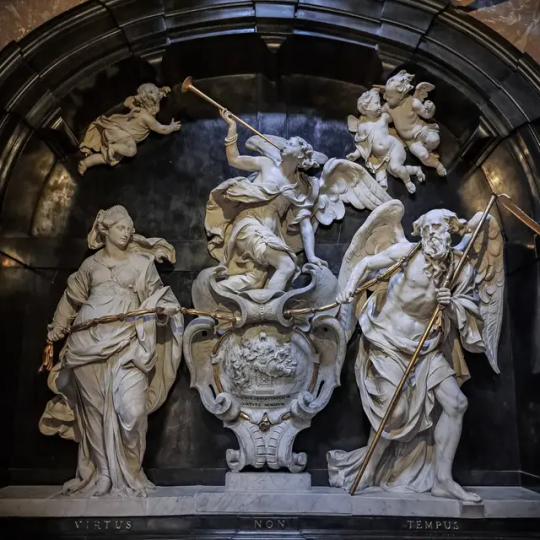





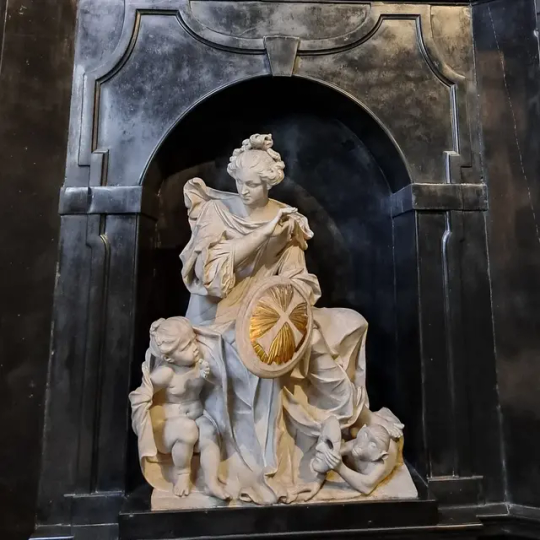

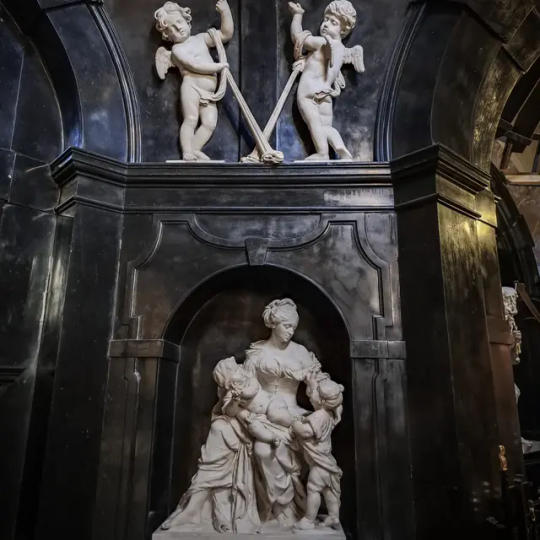
The chapel on the left of the altar of the Onze-Lieve-Vrouw ter Zavelkerk in Brussels belonging to the Thurn und Taxis family.
Saint Ursula Chapel, a unique Italian Baroque style chapel in black Belgian marble and white Carrara marble, was built according to a design by Lucas Fayd'herbe (1617-1697). The sculptures are by various southern Netherlandish sculptors. The restored Caritas statue made by Jan van Delen was recently placed back. The statue was confiscated by French revolutionaries in 1795 and therefore returned after more than 200 years.
The von Thurn und Taxis family initiated international postal traffic in Europe. A German descendant is today known as the richest man in his thirties and the largest private landowner in Europe with 28,000 hectares. The powerful 'DHL predecessors' von Thurn und Taxis had the chapels added to the church in the second half of the seventeenth century.
Von Thurn und Taxis (also Thurn and Tassis in Dutch) is a German noble family of Italian origin that acquired great wealth through its activities in the postal system. The current monarch, Albert II von Thurn und Taxis, resides in the Fürstliches Schloss of Regensburg. For two centuries the family was based in Brussels, where they owned a city palace (ca. 1500-1700). The still existing site of Thurn and Taxis was at the time the grazing land for the post horses.
The patriarch of the postal dynasty was Omodeo Tasso, the first family member to be located in Cornello dei Tasso. At the end of the 13th century, he and 32 relatives organized the Compagnia dei Corrieri, a courier company that worked on behalf of the Serenissima (Venice). She provided foot connections between Venice, Milan and Rome, Genoa,... The Bergamots had always occupied a major place in the old Venetian postal service (couriers were called bergamaschi in Italy). At the end of the 15th century they organized themselves into the Compagnia dei Corrieri dei Roma, a company controlled by the Tasso family.
Other members of the family were called to the Papal States to take care of the papal post. They did this from 1460 to 1539. It was two brothers from another branch who eventually took the business to a European level: Janetto and Francesco. As head of the family (procuratore generale della famiglia e società di Tassi), Janetto entered into a contract with Emperor Maximilian I to set up a truly transnational post (1489-90). He had to connect the emperor's headquarters in Innsbruck with Italy, the Burgundian Netherlands (Mechelen) and France. Janetto was given the title Kuriermeister and called on his brother Francesco and his cousin Giovanni Battista. Under the leadership of the trio, an innovative relay service was created that allowed messages to travel at a speed never before seen in Europe. Thanks to a succession of stopping places along the routes, it was possible to constantly change horses and riders. Only the leather mailbag ("Felleisen") was constantly in motion.
Francesco settled in the Netherlands around 1500, after his brother David had prepared the way. Under Maximilian's son Philip the Fair, he became postmaster and captain and had a beautiful city palace built in Brussels. After the government of Spain de facto fell to Philip, he renewed his agreement with Francesco of Tassis. The new postal contract of January 18, 1505 included more destinations and, for the first time, binding order deadlines (extended in winter). The postmaster guaranteed strict compliance with his life. A star-shaped network of postal routes departed from Brussels: to Innsbruck, to Paris-Blois-Lyon, to Toledo-Granada. For the important route to Spain, an alternative was provided via the Alps and the sea in the event of war with France.
#architecture#europe#historic buildings#historical#architectural history#belgium#history#historical interior#art history#sculptor#sculpture#scultura#sculptures#arte#artwork#art style#baroque#barok#baroque art#baroque architecture#brussels#brussel#bruxelles#bruselas#postal#post#mail#courier#postal service#chapel
39 notes
·
View notes
Photo

Siege of Fort Meigs
The Siege of Fort Meigs (28 April to 9 May 1813) was a major engagement on the northwestern frontier of the War of 1812. It saw a US army under Major General William Henry Harrison, holed up in the hastily built Fort Meigs, withstand a siege by British and Native American forces despite heavy casualties.
Siege of Fort Meigs
D.W. Kellogg & Co. (Public Domain)
Background
On 16 August 1812, the US outpost of Fort Detroit surrendered to a British and Native American force after a brief and nearly bloodless siege. At a stroke, the British had seized control of the entire Michigan Territory, which they could now use as a staging ground for an invasion of western US states like Ohio or Kentucky. Even worse from a US perspective, the Siege of Detroit had emboldened several previously neutral Native American nations to side with the British and begin to attack US outposts and settlements. Many of these northwestern Native Americans had been driven from their lands by the US after the Battle of Fallen Timbers (20 August 1794) and were eager to reclaim what they had lost; indeed, the British promised to help the Native Americans set up their own, independent confederacy on lands west of the Ohio River. Such a confederacy would serve British interests by acting as a buffer state between Canada and the US.
The US was anxious to prevent a hostile, British-backed Native American confederacy from arising on its western frontier and knew that it had to balance the scales by retaking Detroit. Such an important task was entrusted to William Henry Harrison, the popular former governor of the Indiana Territory and the hero of the Battle of Tippecanoe (7 November 1811). Harrison was given the rank of major general and placed in command of the newly formed Army of the Northwest, comprised mainly of raw volunteers from Kentucky and Ohio serving six-month enlistments. In early October, this army set out from Fort Defiance in Ohio, but bad weather and poor logistics slowed its advance to a crawl. Before long, winter was setting in, and Harrison begrudgingly concluded that he would be unable to assault Detroit before spring. He ordered the advance column of his army, under Brigadier General James Winchester, to continue marching to the Maumee Rapids (near present-day Toledo, Ohio) where they would begin setting up camp for the winter.
Winchester's men arrived at the Maumee Rapids in mid-January 1813. Having been on the march for weeks by this point, most of these men were cold, wet, and hungry; many of their enlistments were about to expire, and they longed to fight a battle before being sent home if only to make their long miles of miserable marching worth it. They would soon get an opportunity, as word reached their camp that a detachment of Canadian militia had occupied Frenchtown, a small community on the River Raisin in Michigan, and was harassing its inhabitants. The Americans begged Winchester to let them march to Frenchtown's rescue. Winchester, enticed by the prospect of an easy victory, relented and sent several companies of Kentuckians into Michigan.
The British-American War of 1812
Simeon Netchev (CC BY-NC-ND)
On 18 January, the Kentuckians easily routed the Canadians, causing an elated Winchester to move the rest of his column to Frenchtown as well. Once there, the inexperienced Americans grew complacent, neglecting to post adequate pickets or fortify their position. Therefore, the Americans were caught by surprise when a British and Native American force, under Sir Henry Procter, counterattacked just before dawn on 22 January. The Americans were defeated, and many were killed in the fighting. Of the survivors, those who could walk were taken across the Detroit River to Amherstburg as prisoners, while those too wounded to move were left behind in Frenchtown. That night, many of these wounded would be massacred by Potawatomi warriors allied with the British.
Continue reading...
18 notes
·
View notes
Text
Actual A.P. Bio Season Four Thoughts

(I posted this on reddit first because the A.P. Bio fandom is less dead there, but I may as well throw it out to tumblr too, why not?)
As you know if you're reading this, there was a love-hate response to season four of A.P. Bio. Here's what I think was lacking in this season.
In my opinion seasons two and three are the best, and this is largely because Jack has a clear conflict, which is he's writing and trying to publish a book while also trying to decide if he just wants to stay in Toledo with Lynette. This conflict pushes his character arc forward and is what gave the show direction. In season four, obviously Lynette's actor had to leave, but they also totally abandoned his book for no reason? Like the book he was working on for two seasons? This felt like it threw off his arc a little and made the season feel a bit directionless.
Because even in season one Jack has an overarching goal to take down Miles. In season four he doesn't have anything like that. He doesn't have a book to write or a rival to takedown or any short term goal at all. In seasons two and three he was being forced to making a choice between his book and Lynette, between Harvard and Toledo, and it felt like it symbolized his whole character arc and the conflict was so clear and laid out a good path for the story.
But all of that is gone in season four without a new overarching goal, plan, or conflict to replace it.
Not to mention Shayla was inserted too quickly into the story in order to replace Lynette. Jack isn't even given time to get over Lynette, even less so be given even close to the time to start liking Shayla. Given he and Lynette had an entire season together before they were official, shuffling Shayla into Lynette's role mid-season out of nowhere felt pretty cheap. I know the writers were trying to do what they could, but Lynette played a pivotal role in Jack's character arc that no other love interest could simply fill, and I don't even want to begin to analyze it too deeply or this post will be an ungodly length.
I will say, even though season four did disappoint me in that way, I did like it on an episodic level. We had some great moments such as the A.P. kids starting a cult, Jack having a tantrum and screaming into a pillow, Jack's father appearing and of course the scene where Jack gets attacks by roughhouses with his step brother, Jack and Marcus finally bonding a bit over a boardgame, and of course Jack delivering a baby and then walking into his classroom covered in blood and blabbering about the miracle of life. Some people don't like the wackier and more chaotic comedy introduced in seasons three and four but I love it.
Also do want to add seasons two and three aren't only my favorites because of Jack having a clear goal, I think those are the seasons that had the best comedy and character chemistry, and also season two and three have most of my favorite episodes, such as Nuns and the Katie Holmes Day one.
Anyway, this post is just to clarify the specific reason why season four didn't quite land for me, without spreading hate for it, and of course I really wish we got a season five. I know it's not likely given the fact that it's been some time since the show ended, rights would have to be sorted, and they'd have to start balancing Glenn Howerton's schedule again despite him acting long term in Sunny, but if this new Netflix deal could end in just one more season to wrap up character arcs, that would be like, really really great, and I do feel like most the cast would be down for it saying a lot of them are still passionate about the show.
16 notes
·
View notes
Text
UPDATE: I'm thinking that the book that gets more votes isn't the only one I will share scans, just it will be the first one and then eventually I'll share in order following the number of votes they got.
Or I will include the less voted books in another polls and include some other options I didn't include in this first poll.
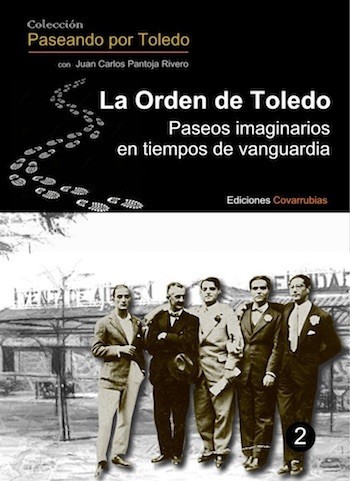
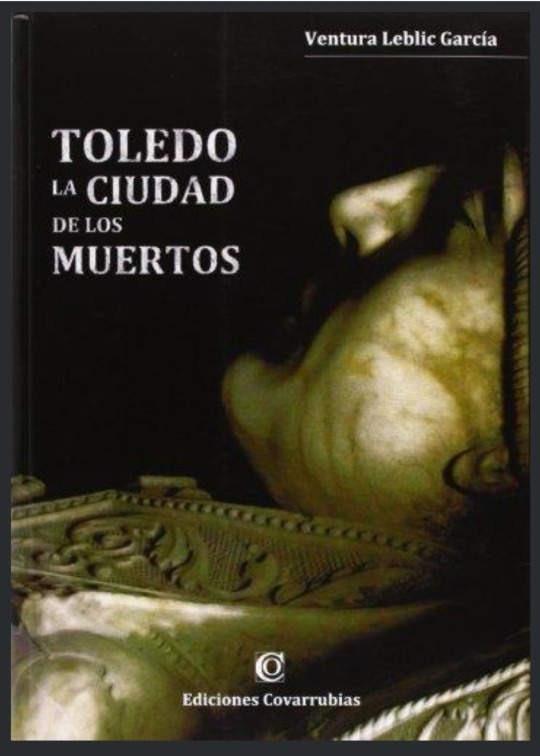
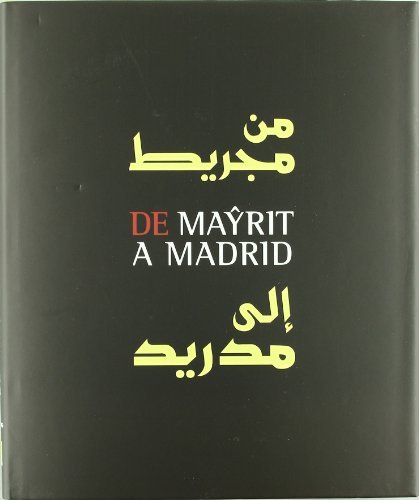
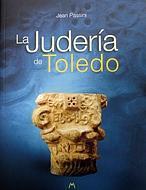
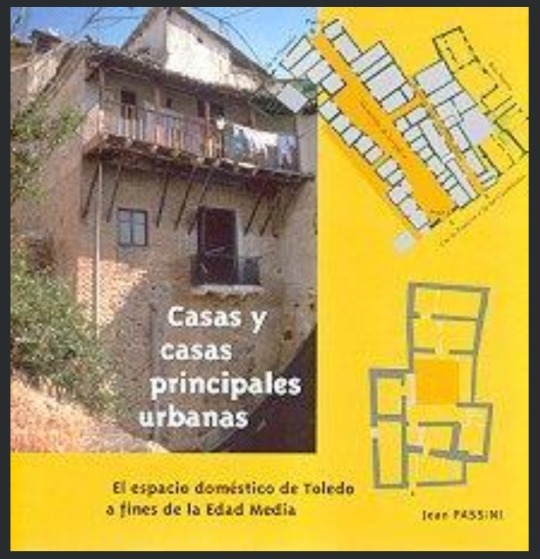
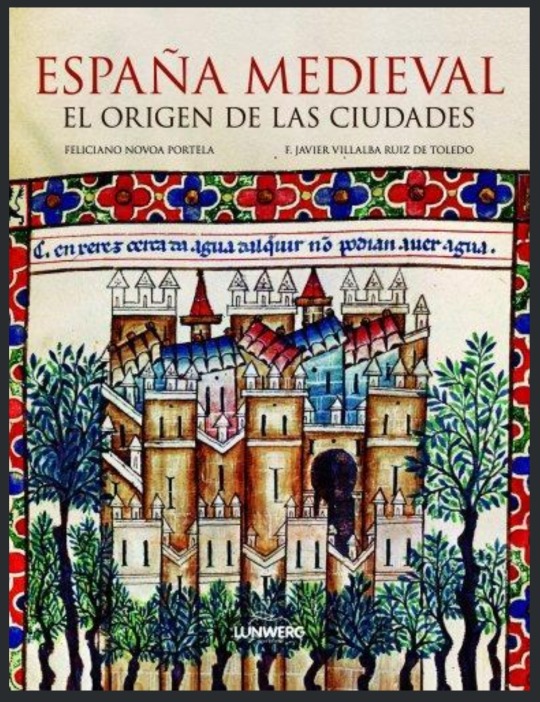


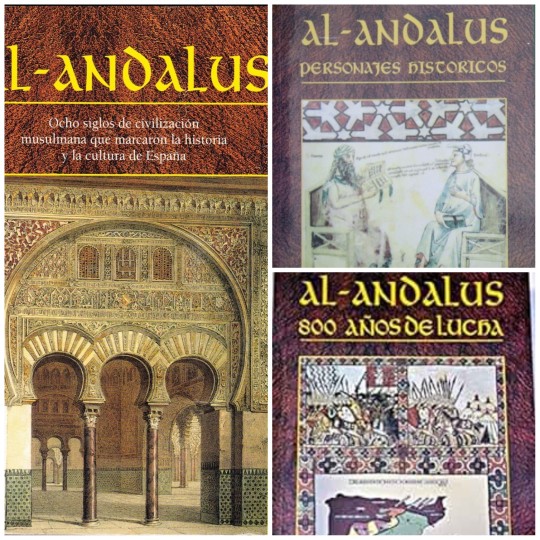

Propaganda
1. La Orden de Toledo: Paseos imaginarios en tiempos de vanguardia (The Order of Toledo: Imaginary walks in avant-garde times)
Author: Pantoja Rivero, Juan Carlos
Editorial: Covarrubias Ediciones
Edition: 2019
Synopsis: The Order of Toledo was, above all, an avant-garde fantasy of the brilliant film director Luis Buñuel, who knew how to infect his friends from the Generation of '27 to the Spanish intellectuality of the first third of the 20th century. Together, they dedicated themselves to living Toledo as if it were the great stage of a surrealist montage, in an artistic (or anti-artistic and irational) contrast with the monumentality and historical past of the old dead city.
(Well, in my blog I have been making posts about The Order of Toledo and the book is a valuable source)
2. Toledo: La ciudad de los muertos (Toledo: The city of the dead)
Author: Leblic García, Ventura Editorial: Covarrubias Ediciones Edition: 2013
Synopsis: Toledo. A large historical necropolis where Carpetans, Romans, Visigoths, Muslims, Jews and Christians rest...their rites around death, beliefs, customs, evolution of the cemetery spaces...
(I have posted the scans of the first pages of this books and I'm planning to keep on posting them but I wanted to know if you want scans from another book)
3. De Mayrit a Madrid: Madrid y los árabes del siglo IX al siglo XXI (From Mayrit to Madrid: Madrid and the Arabs from the 9th century to the 21st century) Editors: Madrid. Casa Árabe e Instituto Internacional de Estudios Árabes y del Mundo Musulmán ; Barcelona ; Madrid: Lunwerg Edition: 2011
Synopsis: This work deals with the Arab-Islamic past (Andalusian, Mudejar and Moorish) of Madrid and its forgotten heritage since it is the only European capital whose origins and name are linked to Arabic.
Revisiting that past and making it known is the objective of this work, which wants to rescue knowledge of a relationship between Madrid and the Arabs that does not end in the Middle Ages, since the town and court maintained various links with what was over time. Arab through diplomatic delegations, Arab figures welcomed by the city, valuable collections of manuscripts and numismatics, a romantic architectural taste that seeded the city with unique neo-Islamic buildings or Hispano-Arab scientific and cultural institutions. And, finally, the cosmopolitan and intercultural reconversion of the city has made it the recipient of a new Arab and Muslim immigration that once again gives human visibility to this relationship between Madrid and the Arab.
4. La Judería de Toledo (The Jewish Quarter of Toledo)
Author: Passini, Jean
Editorial: Ediciones del Sofer
Edition: 2014
Synopsis: The work reveals the vestiges of the areas of medieval Toledo Jewry and its history. It collects a topographical reading of its evolution and offers the main elements through maps, plans and high-quality color photographs.
5. Casas y casas principales urbanas : el espacio doméstico de Toledo a fines de la Edad Media (Houses and main urban houses: the domestic space of Toledo at the end of the Middle Ages)
Author: Passini, Jean. Editor: Toledo. Universidad de Castilla-La Mancha
Edition: 2004
Synopsis: This work is an extension of previous research on different districts, and seeks, for the city as a whole, to “understand the genesis of medieval urban space, to follow its transformations and successive reappropriations” , mainly with the aim of understanding, for one of the ancient provincial capitals of al-Andalus, the modalities of the transition from the Muslim city of the end of the eleventh century (time of its occupation by the Christians) to the Castilian city of the end of the Middle Ages. The main documentary basis of the work is a very important and very detailed inventory of the real estate of the Cathedral Chapter, an inventory carried out in 1491-1492, which covers a considerable heritage of 557 various buildings located in 64 sites or districts. The identification and location of houses, shops, mesones or fondouks and other urban buildings, often difficult on the current plot, has however resulted in the careful study of more than half of these old buildings. The systematic comparison of the text from the end of the Middle Ages with the remains still visible above ground or underground (and this very meticulous and patient work in the cellars of current Toledan houses is one of the great originalities of the research of Jean Passini) gave the results which are presented in this latest publication.
6. España medieval : el origen de las ciudades (Medieval Spain: the origin of the cities)
Authors: Novoa Portela, Feliciano; Villalba Ruiz de Toledo, F. Javier Editors: Barcelona ; Madrid : Lunwerg, D.L.
Edition: 2012
Synopsis: A fascinating essay that will teach us to look at and understand our cities better. In the pages of this essay we will analyze the Roman origins, the Islamic, Christian and European influences to discover the cultural melting pot that marks the Spanish urban legacy, without forgetting some disappeared cities that tell us their history through archaeological remains.
7. Valle-Inclán y el insólito caso del hombre con rayos x en los ojos (Valle-Inclán and the unusual case of the man with x-rays in his eyes)
Editors: Madrid. La Felguera
Edition: 2014 Synopsis: In 1923, a piece of news sparked great controversy among intellectuals, journalists and scientists. Joaquín Argamasilla, a young descendant of a family of aristocrats, claimed to have x-ray vision that allowed him to see through opaque bodies. The controversy, which divided half the country between defenders and detractors of the strange case, reached the highest circles. In April, at the initiative of Queen María Cristina, a commission was established to study the case, chaired by Ramón y Cajal. Valle-Inclán came to Argamasilla's defense and the great Harry Houdini challenged him to a public demonstration in New York.
(Joaquín Argamasilla, Harry Houdini, Valle-Inclán, Ramón y Cajal... yep, we're thinking the same, episode 2xO6, Tiempo de Magia, from El Ministerio del Tiempo, if anyone wants to learn more about this topic this book is good)
8. Guía mágica de Toledo y su provincia (Magical guide to Toledo and its province) Authors: Rodríguez Bausá, Luis; Álvarez de Toledo, Javier Mateo Editorial: Ediciones Covarrubias
Edition: 2010
Synopsis: Saramago wrote that traveling should be a matter of another matter, staying more and walking less; and a little later he added that it is not good to stay for only a quarter of an hour next to a construction that is seven hundred years old. The authors agree with such appropriate phrases, and that is why they have written this route, this uneven guide, this compilation of events, in short, so that the traveler stops in a multitude of towns that only sounded like transit and never like stop and inn. Because the truth is that the city of Toledo and its province discreetly hide a large number of enclaves that deserve to be savored by the five senses, and in which one must rest until the memory is macerated. This is what this work talks about: caves, sacred mountains, magical wells, rainy images, enchanted fountains or thunderous miracles... but, above all, towns, cities and regions; yes, with order and a taste of dissidence and heterodoxy.
Also included is what the authors have called "Beginner's Guide", a brief but rigorous approach to the magical phenomenon, something like an index so that whoever wants it, has the basic premises to get started in the world of research on these issues.
9. AL-ANDALUS. Ocho siglos de civilización musulmana que marcaron la historia y la cultura de España (AL ANDALUS. Eight centuries of Muslim civilization that marked the history and culture of Spain) Author: Masiá, Concha Editorial: ALBA Edition: 2006
Synopsis: "In the year 711, the Muslims arrived in the Iberian Peninsula. They called the vast territory where they settled for 800 years, from Tarifa to the Pyrenees, from the Levant to Portugal, al-Andalus. With their lights and shadows, these eight centuries of Muslim civilization, configuring many aspects of our personality as a people and as a culture, to which we Spaniards of the 21st century are still indebted"
This book and the following two books are like a triology about Al Andalus. This first one collects information about the different periods, states, events and some of its rulers throughout the history of Al Andalus.
10. AL-ANDALUS. Personajes históricos (AL ANDALUS. Historical figures) Author: Masiá, Concha Editorial: Albor Libros, Madrid Edition: 2011
Synopsis: "A general vision of al-Andalus, from the 8th century to the 17th century, through its most prominent characters and also through less known, although no less important, people. Both of them reveal the splendor and glory of the imperishable Andalusian legacy"
This book gathers information about divers people from different states and periods throughout the history of Al Andalus: emirs, caliphs, politicians, religious leaders, warriors, scholars, artists, philosophers, poets...
11. AL-ANDALUS. 800 años de lucha (AL ANDALUS. 800 years of struggle)
Author: Masiá, Concha Editorial: Albor Libros, Madrid Edition: 2011
Synopsis: "In the year 711, the Muslims arrived in the Iberian Peninsula. They called the vast territory where they settled for 800 years, from Tarifa to the Pyrenees, from the Levant to Portugal, al-Andalus. With their lights and shadows, these eight centuries of Muslim civilization, configuring many aspects of our personality as a people and as a culture, to which we Spaniards of the 21st century are still indebted"
This book offers a view on the warfare, battles and military campaigns from different periods and states throughout the history of Al Andalus.
12. 20 grandes obras de 20 autores andalusíes (20 great works by 20 Andalusian authors)
Author: Lirola Delgado, Jorge
Editorial: FUNDACIÓN IBN TUFAYL DE ESTUDIOS ARABES
Edition: 2014
Synopsis: Selection of 20 Andalusian authors and 20 works from the different periods of al-Andalus. The book offers a biography of each author and a detailed description of the work.
#bookblr#books#history#polls#history books#spanish history#al andalus#la orden de toledo#paseos imaginarios en tiempos de vanguardia#toledo: la ciudad de los muertos#de mayrit a madrid#madrid y los árabes del siglo IX al siglo XXI#la judería de toledo#casas y casas principales urbanas#el espacio doméstico de Toledo a fines de la Edad Media#españa medieval : el origen de las ciudades#valle-inclán y el insólito caso del hombre con rayos x en los ojos#guía mágica de toledo y su provincia#AL-ANDALUS. Ocho siglos de civilización musulmana que marcaron la historia y la cultura de España#AL-ANDALUS. Personajes históricos#AL-ANDALUS. 800 años de lucha#20 grandes obras de 20 autores andalusíes#sefarad#madrid#toledo#the order of toledo#The Order of Toledo: Imaginary walks in avant-garde times#Toledo: The city of the dead#From Mayrit to Madrid#Madrid and the Arabs from the 9th century to the 21st century
10 notes
·
View notes
Text

Saint Beatrice of Silva
1424-1492
Feast Day: September 1, August 17 (trad.)
Patronage: Conceptionist nuns, prisoners
Saint Beatrice of Silva was born in Portugal to nobility and raised in the household of the future Queen Isabella of Castile. She became Isabella’s lady in waiting but incurred her jealous wrath because of her beauty. Queen Isabella had her imprisoned. She escaped to a Cistercian convent in Toledo and lived there until at 60 years old she had a vision from Our Lady to start a new order of nuns, the Congregation of the Immaculate Conception of the Blessed Virgin Mary. She died of natural causes.
Prints, plaques & holy cards available for purchase here: (website)
40 notes
·
View notes
Text

Notice anything different in both these portraits?
Well, one is the original and the other is photoshopped by some stupid men who think women should look a certain way or meet certain standards.
Which is which U decide that.
The point is, men have been photoshopping women even before modern editing tools existed. i remember a similar tumblr post reading on this but i don't remember the writer of it so... here i am making my own.
This is the portrait of Isabelle de'Medici, the spirited favourite daughter of Cosmo de'Medici, the first grand duke of Florence and Eleanor of Toledo, a famed beauty.
"A pennsylvania museum has solved the mystery of a renaissance portrait in an investigation that spans centuries, layers of paint and the murderend daughter of an Italian duke."
Her real portrait was hidden under the layers of paint done by probably a Victorian painter to adhere to the beauty standards of the 19th century in order to resell it.
But those who are quite history maniacs like me will understand which is the photoshopped painting immediately. one painting just looks wrong when focused on, particulary the face. sure, the clothes are spot on and so is everything else, but what is missing is how the face is not reflecting the beauty standards of the 16th century.
Which is interesting if you know even a little about her life. She was not some average little spoiled princess. Oh she was quite a badass bitch of her time.
At the age of 16 she was married into the Orsini family in hopes of securing an alliance and since, contrary to popular belief, the renaissance people were not into the idea of child brides as such, so she stayed in her own home until she was of appropriate age and then sort of, never left.
Later on in her life she consolidated a great amount of political power as she basically stepped up as the First Lady of Florence when her mother died and was considered as one of the keenest political minds of her time. Surprisingly, she also enjoyed a great deal of freedom uncommon among the women of her time. Basically, she did what she wanted, fucked whoever she wanted to and no one was able to tell her no.
She was possibly murdered by her husband through strangulation. Although this is only a speculation or perhaps on her brother's orders who wanted to step up as the new Grand Duke of Florence and his sister was in his way. The motive can be jealousy as well as she was fucking her husbands cousin at that time.
And yes.... her husband was an asshole who was useless in money matters and her father hated him. so Isabelle got to live freely with her dowry intact.
Now tell me,
I will elaborate on this when the vote is over because then i will be able to share the necessary details.
Also, I will link the source of this if I find it.
PS: If you have ever looked at Mona lisa deeply you will know which painting is the original and which is not.
#History#art#artwork#artists on tumblr#Medici#house of medici#Italian history#world history#renaissance
9 notes
·
View notes
Text
10 Jewish Women from History Part 2
Shushandukht (4th to 5th centuries, Persia)
Jewish wife of a Sasanian emperor and mother of another. She was said to be the daughter of an Exilarch. She reputedly created the Jewish neighborhoods of Jouybareh in Isfahan and also communities in Susa and Shushtar. She is believed to be fictional by some.
Benvenida Abrabanel (1473-1560s, Italy)
A Sephardic philanthropist, banker, and businesswoman mentioned in literary, rabbinic, legal, and archival sources. Born to a prominent Spanish family, the Abravanel family, she received an education in both Jewish and secular subjects. Following the Expulsion of Jews from Spain in 1492, her family moved to Naples, where she became the tutor of Eleanor of Toledo. After the Holy Roman Emperor declared an expulsion of Jews in 1533, she co-protested and managed to get the order postponed by ten years. She and her family eventually moved to Ferrara. After her husband's death, she was made heir to almost all of his property, and she took over his business affairs, opening five banks in Florence.
Shlomtzion (1 century BCE, Judea)
A regnant queen of Judea, and the wife of Aristobulu I and Alexander Jannaeus. She ruled for nine years in the times of the Hasmonean dynasty. On his deathbed, Alexander trusted the government to his wife instead of his sons. She installed her eldest son as high priest and reestablished the Sanhedrin, and protected the Pharisees. Judea enjoyed much prosperity under her reign.
Licoricia of Winchester (1200s-1277, England)
An English Jewish businesswomen, described as the most important Jewish woman in medieval England. She was a moneylender, and appeared to have had a close relationship with King Henry III. She first appears in records from 1234 as a young widow with three sons and a daughter. In 1242, she married her second husband, who was known as the richest Jew in England. After her husbands death, she was detained by the king so that he could acquire part of her husband's estate; however, she repurchased his estate for 5,000 marks. Over the next thirty years after she was released, she became a highly influential businesswoman.
Esther Handali (?-1588, Ottoman Empire)
A Sephardic Jew reportedly from Jerez de la Frontera in Spain, she was married to a Jewish merchant who sold products to the Ottoman Imperial Harem. Due to the separation of the sexes, she would enter the harem as an agent for her husband. When she was widowed, she took over her husband's business. She was kira, or agent, of Nurbanu Sultan from at least 1566 onward, after Nurbanu became the favored consort of the sultan. She was trusted with political and diplomatic matters, including acting as intermediary between Nurbanu and Catherine de' Medici, as well as contacts in the Republic of Venice. She earned an enormous fortune, and was a benefactor to the Jews of Istanbul, especially widows and orphans and victims of the 1969 fire.
Esperanza Malchi (?-1600, Ottoman Empire)
A Jewish businesswoman in the Ottoman Empire and agent of Safiye Sultan. Reportedly from Italy, she acted as an agent for her husband, a Jewish businessman, in the Ottoman harem. It's difficult to separate her from Esther Handali since their careers overlap. Esperanza was trusted with political and diploamtic matters such as correspondence between Safiye and foreign powers, including the Queen of England.
Qasmuna (11th or 12th CE, Andalusia)
A poet from medieval Andalusia, and the only female Arabic language Jewish poet from the region. Three poems of her have survived. The most famous one is about how she looked in the mirror and decided she had reached the time of marriage.
Sarah of Yemen (6th century CE, Yemen)
A female composer of pre-Islamic Arabic poetry. She was potentially a member of Banu Qurayza, a Jewish tribe which lived in northern Arabia and was one of the major three Jewish tribes, along with Banu Qaynuqa and Banu Nadir.
Wife of Dunash ha-Lebi ben Labrat (920/925-after 985, Morocco or Spain)
Wife of a medieval Jewish commentator, poet, and grammarian from the Golden age of Jews in Spain. She is believed to be the author of a poem on Dunash's exile, making it the only known medieval Hebrew poem written by a woman.
Henrietta Szold (1860-1945, Baltimore)
Born in Baltimore, Maryland, she was the daughter of a rabbi and the eldest of eight daughters. Educated in Jewish studies, she edited Professor Marcus Jastrow's Talmudic Dicitonary, and attended lectures at Johns Hopkins and the Peabody Institute. She also studies at JTS, and studies in the rabbinic school on the promise she would not seek ordination, as the rabbinic school was restricted to males. A religious Zionist, she and six other woman eventually founded Hadassah, the Women's Zionist Organization of America. She funded hospitals, a medical school, soup kitchens, and other services for both Jewish and Arab inhabitants of Mandatory Palestine. In 1933, she immigrated there and helped run Youth Aliyah, an organization that saved 30,000 Jewish children during the Nazi regime. She also supported Brit Shalom, a small organization dedicated to Arab-Jewish unity.
#jewish#jewish women#jewish women's history#feminism#jumblr#there's so little history on Jewish women but for those that are recorded. they're badass.
12 notes
·
View notes
Text

Sancho III
Artist: Jose Madrid Castelaro y Perea (Spanish, 1801-1873)
Date: c. 1851
Medium: OIl on canvas
Collection: Museo del Prado, Madrid, Spain
Sancho III of Castile
Sancho III (c. 1134 – 31 August 1158), called the Desired (el Deseado),[was King of Castile and Toledo for one year, from 1157 to 1158. He was the son of Alfonso VII of León and Castile and his wife Berengaria of Barcelona, and was succeeded by his son Alfonso VIII. His nickname was due to his position as the first child of his parents, born after eight years of childless marriage.
During his reign, the Order of Calatrava was founded. It was also in his reign that the Treaty of Sahagún in May 1158 was decided.
Painting Description
The king, in the representation imagined by the painter, is descending the steps on which the throne is located. He is dressed in a crimson-coloured overcoat, embroidered in gold, with a fur lining, and his left hand is resting on his sword. The neutral background is broken up by the presence of the curtain situated behind the throne that closes the composition. Deposited in the Congress of Deputies. Madrid.
#portrait#ancient king#king of castile#sancho iii#standing#full length#crimson colored overcot#gold enbroidery#fur lining#sword#curtain#throne#king of castile and toledo#oil on canvas#painting#oil painting#european art#spanish culture#spanish history#jose madrid castelero#spanish painter#museo del prado#19th century painting
14 notes
·
View notes